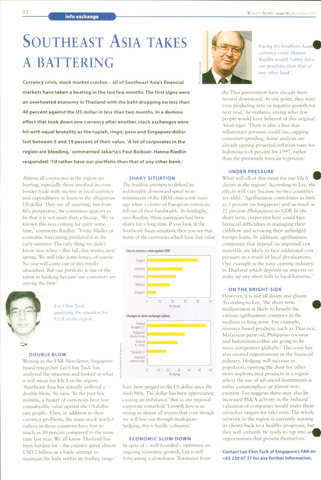SOUTHEAST ASIA TAKES
A BATTERING
V
12
info exchange
WHAT'S NewS Issue 10 November 1997
Currency crisis, stock market crashes - all of Southeast Asia's financial
markets have taken a beating in the last few months.The first signs were
an overheated economy in Thailand with the baht dropping no less than
40 percent against the US dollar in less than two months. In a domino
effect that took down one currency after another, stock exchanges were
hit with equal brutality as the rupiah, ringit, peso and Singapore dollar
lost between 5 and 19 percent of their value. 'A lot of corporates in the
region are bleeding,' commented Jakarta's Paul Beiboer. Hanno Riedlin
responded: 'l'd rather have our portfolio than that of any other bank.'
Almost all corporates in the region are
hurting, especially those involved in cross
border trade with income in local currency
and expenditures or loans in the ubiquitous
US dollar. They are all smarting, hut from
RI's perspective, the consensus appears to
be that it is not more than a hiccup. 'We've
known this was coming for quite some
time,' comments Riedlin. 'Yvette Muller of
economie forecasting predicted it in the
early summer. The only thing we didn't
know was when - this fall, this winter, next
spring. We will take some losses, of course.
No one will come out of this totally
unscathed. But our portfolio is one of the
safest in banking because our customers are
among the best.'
Lee Chin Tuck
analyzing the situation for
F&A in the region.
DOUBLÉ BLOW
Writing in the FAR Newsletter, Singapore-
based researcher Lee Chin Tuck has
analyzed the situation and looked at what
it will mean for F&A in the region.
'Southeast Asia has actually suffered a
doublé blow,' he says. 'In the past few
months, a basket of currencies have lost
considerable value against the US dollar
(see graph). Then, in addition to their
currency problems, the main stock market
indices in those countries have lost as
much as 50 percent compared to the same
time last year. We all know Thailand has
been hardest hit - the country spent almost
USD 2 billion in a futile attempt to
maintain the baht within its trading range.'
SHAKY SITUATION
The fruitless attempts to defend an
indefensible downward spiral were
reminiscent of the ERM crisis some years
ago when a cluster of European currencies
feil out of their bandwidth. 'In hindsight,'
says Riedlin, 'those currencies had been
shaky for a long time. If you look at the
Southeast Asian situation, then you see that
many of the currencies which have lost value
Loss in currency value against USD
Thailand
Indonesia
Philippines
Malaysia
Singapore
Changes in stock exchange indices
Thailand
Bangkok SET
Philippines
Manila Comp.
Malaysia
KL Comp.
Singapore ST
Indonesia
Jakarta Comp.
s %change
have been pegged to the US dollar since the
midl980s. The dollar has been appreciating
causing an imbalance.' But as one regional
corporate remarked: 'Growth here is so
strong in almost all sectors that even though
we will lose out through inadequate
hedging, this is hardly a disaster.'
ECONOMIC SLOW DOWN
In spite of - well-founded - optimism on
ongoing economie growth, Lee is still
forecasting a slowdown. 'Estimates from
Facing the Southern Asian
currency crisis, Hanno
Riedlin would 'rather have
our portfolio than that of
any other bank
the Thai government have already been
revised downward. At one point, they were
even predicting zero or negative growth for
next year,' he explains, saying what few
people would have believed of this original
Asian tiger. 'There is also a fear that
inflationary pressure could rise, capping
consumer spending. Some analysts are
already upping projected inflation rates for
Indonesia to 8 percent for 1997, rather
than the previously forecast 6 percent.'
UNDER PRESSURE
What will all of this mean for our F&A
clients in the region? According to Lee, the
effects will vary because no two countries
are alike. 'Agribusiness contributes as little
as 1 percent (in Singapore) and as much as
22 percent (Philippines) to GDP. In the
short term, corporates here could face
financial difficulties in managing their
cashflow and servicing their unhedged
foreign loans. In addition, agribusiness
companies that depend on imported raw
materials are likely to face additional cost
pressure as a result of local devaluations.
One example is the tuna canning industry
in Thailand which depends on imports to
make up any short falls in local harvests.'
ON THE BRIGHT-SIDE
However, it is not all doom and gloom.
According to Lee, 'the short-term
readjustment is likely to benefit the
various agribusiness countries in the
medium to long-term. For example,
resource based products, such as Thai rice,
Malaysian palm oil, Philippino coconut
and Indonesian coffee are going to be
more competitive globally.' The crisis has
also created opportunities in the financial
industry. Hedging will increase in
popularity, opening the door for other
more sophisticated products in a region
where the use of advanced instruments is
either commonplace or almost non-
existent. Lee suggests there may also be
increased M&A activity as the reduced
valuation of companies would make them
attractive targets for take-over. The whole
network in the region is currently nursing
its clients back to a healthy prognosis, but
they will certainly be ready to tap into ar
opportunities that present themselves.'
Contact Lee Chin Tuck of Singapore's FAR on
+65 230 67 37 for any further information.

